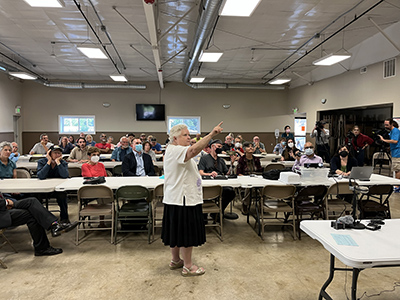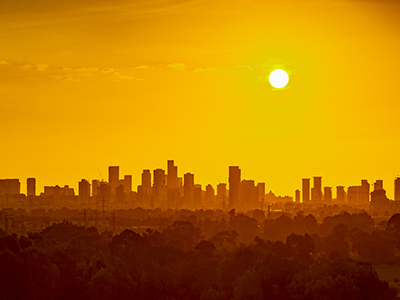Water, Climate and Health program makes an impact in Nebraska
The Water, Climate and Health Program brings together experts from UNMC, DWFI and the Institute of Agriculture and Natural Resources at the University of Nebraska to address Nebraska’s most pressing public health issues related to water and climate. Water, Climate and Health Program Director Jesse Bell also serves on DWFI’s leadership team. The program makes an impact both in Nebraska and around the globe.
Researchers provide update on AltEn to Mead community

Credit: UNMC College of Public Health
A team including DWFI researchers has been studying possible effects from the AltEn ethanol plant in Mead, Nebraska, since it shut down after leaked contaminated wastewater was found. They presented to a group of about 50 community members at a Mead Town Hall session in July 2022. The team includes DWFI Director of Water, Climate and Health Jesse Bell, Water Sciences Lab Director Dan Snow and DWFI Faculty Fellows Eleanor Rogan, Shannon Bartelt-Hunt and Liz VanWormer. Bell and Rogan, along with colleagues Ali Khan and Judy Wu-Smart, were present.
The team is particularly concerned with neurotoxins from the neonicotinoids produced by the plant, which is being sued by the state of Nebraska. “[It] raises the level of concern, particularly for infants and children, that they might experience some neurological problem with this. That would be my big concern," said Rogan.
Community members also voiced their concerns about the surrounding streams and wildlife, which are now considered “biologically dead.” In addition to homes, the research team is also sampling the water, soil, air and small animals.
This work is part of UNMC’s partnership with DWFI to assess water quality impacts on health, and the start of the project was funded by the Claire M. Hubbard foundation. The update was covered by several local media outlets.
Climate change already impacting Nebraskans' health
A feature story in the Omaha World Herald this February focused on the effects of climate change on the health of Nebraskans. The story included examples of how climate-induced incidents, from a rare water-borne amoeba to toxic mushrooms and disease-spreading insects, have caused health problems for Nebraskans.
“As you project it forward, those changes will only get greater,” said Bell. “If we don’t understand the potential impacts, it’s going to make us less prepared for the future.”
Already, Nebraska’s average temperature has risen to the point that it is on par with the 1930s, a decade marked by the Dust Bowl, according to the National Centers for Environmental Information.
But within the next 30 years, Nebraska is expected to warm more than it has in the past century-plus, perhaps substantially more, said Martha Durr, DWFI Faculty Fellow and Nebraska’s state climatologist. Durr said it’s possible Nebraska’s average temperature could rise by 5 degrees or more by 2050. If that happens, the state’s average temperature will be higher than 2012, the state’s hottest, driest year on record. That year, Nebraska had its worst wildfires, dozens of communities restricted water use, and range conditions were so poor ranchers sold off portions of their herds.
All of these changes in climate — warmer weather, wetter weather and drought — affect public health, increasing diseases and mental health problems as a result of stress and suffering. Climate change can also cause food insecurity due to severe weather impacts on crop and livestock production.
While most efforts to address climate change focus on slowing greenhouse gas emissions, others by necessity are aimed at identifying threats and preparing for them.
Nebraska and its communities already are taking some steps, but experts say more needs to be done. Some of those steps include monitoring for diseases, bolstering preparedness among public health systems and health facilities, and planning for extremes in weather such as drought and flooding.
Nebraska climate change panel brings together different perspectives
WCHP researchers are actively studying how climate change can impact human health. To further the discussion and share knowledge, the university sponsored a variety of experts to explore the subject with the public in June.
“Extreme heat events likely kill more people in the United States than any other climate-related disaster,” said Bell. The panel also discussed climate change and agriculture; how farmers and ranchers are aware of changing impacts and adapting that in how they tend to land.
Political leaders said they have learned from the historic flooding of 2019 about how preparedness can save time, money, and resources.
“Clean energy is one. Northeast Nebraska is a hotbed of wind energy development and increasingly more and more solar energy. Those things that help us to both reduce carbon put into the atmosphere but also create economic activity in our rural areas are very important,” said Josh Moenning, the Mayor of Norfolk.
The panel also turned its discussion to those in the audience with live surveys. It found their biggest concerns were extreme weather events followed by food security.
Mapping hot spots in Omaha, Neb.

Credit: Shutterstock | Eli Mordechai
Extreme heat kills more people than any other weather event, according to the National Weather Service. To better understand how climate affects local public health, the Water, Climate and Health Program (WCHP) conducted a heat mapping research project in Omaha. Researchers gathered the measurements as part of a national effort by the National Oceanic and Atmospheric Administration’s (NOAA’s) Climate Program Office to map urban heat islands in cities throughout the country.
In Omaha, 68 community volunteers drove the routes, covering about 80 square miles and recording more than 43,000 heat measurements.
Initial observations found temperatures in some parts of eastern Omaha were an average of 9.4 degrees higher than others.
Bell said the measurements are just a starting point.
“We need to do a thorough evaluation and analysis of these results,” he said. “There is work that needs to be done on understanding the differences we are seeing throughout these communities.”
Abdoulaziz Abdoulaye-Adily, the UNMC study coordinator, recently shared the initial findings with community partners. Abdoulaye-Adily said the project is a first step toward better understanding temperature distribution in Omaha. “As extreme heat exposure poses a risk to human health,” he said in a statement, “we can use this information to make informed decisions to reduce risks in our community.”
Some public health strategies that can be used to mitigate heat exposure include engaging the community in the topic as well as investing in urban parks and water features, transforming small areas into green spaces and recreational areas into greener areas, investing in tree canopies along contiguous streets and parks and leveraging existing cool spaces through joint-use agreements.
FY 2023 Annual Report
- Overview
- Introduction
-
Research and Policy
-
Global
- Brazilian agricultural state looks to Nebraska and DWFI to sustainably manage water resources
- Irrigation equipment ownership not always best for smallholder farmers
- McCornick and Neale re-elected to World Water Council, DWFI involved in preparations for the World Water Forum
- Understanding the agtech ecosystem in India can spur future investments
-
Regional + National
- DAWN Project testing its decision-support tools with corn and soybean growers
- Water Center director helps City of Lincoln find second water source
- Water, Climate and Health program makes an impact in Nebraska
- DWFI's flux tower network now helps validate carbon credits
- Understanding climate’s effect on the health of Americans
- Groundwater transfer success stories guide water managers in meeting local water needs
- Advancements in crop modeling help adapt to climate change
-
Global
-
Education
- Faculty Fellows
-
Supported Students
- DWFI funds eight new students working on mission-related projects
- DWFI continues support of Platte Basin Timelapse interns
- Estimation of manure nutrient capacity in Nebraska minimizes water quality impacts
- Could cover crops replace offset in-season corn fertilizer?
- Congratulations to DWFI-supported student graduates
-
Communication
- Digital and online engagement connects DWFI with its global audience
- Coverage of DWFI research and events reaches more than 219 million people
- Creative storytelling used to amplify DWFI smallholder irrigation research outputs
- DWFI expertise tapped for national reports and publications
- DWFI staff receive well-deserved recognition
- 2022 Nebraska Water Center Annual Report now available
-
Outreach and Events
- Global Conference draws international audience to address water and food security
- On-farm event in Western Nebraska strengthens partnerships, spurs new ideas
- Engagement recovers to pre-pandemic levels
- Drought at forefront of discussions at Platte River Basin Conference
- 49th Annual Water Tour broadens knowledge about Nebraska water
- Nebraska Water Center seminars focus on hot topics in Nebraska Water
- Development
- Resources
- Search
FY 2023 Annual Report
- Overview
- Introduction
-
Research and Policy
-
Global
- Brazilian agricultural state looks to Nebraska and DWFI to sustainably manage water resources
- Irrigation equipment ownership not always best for smallholder farmers
- McCornick and Neale re-elected to World Water Council, DWFI involved in preparations for the World Water Forum
- Understanding the agtech ecosystem in India can spur future investments
-
Regional + National
- DAWN Project testing its decision-support tools with corn and soybean growers
- Water Center director helps City of Lincoln find second water source
- Water, Climate and Health program makes an impact in Nebraska
- DWFI's flux tower network now helps validate carbon credits
- Understanding climate’s effect on the health of Americans
- Groundwater transfer success stories guide water managers in meeting local water needs
- Advancements in crop modeling help adapt to climate change
-
Global
-
Education
- Faculty Fellows
-
Supported Students
- DWFI funds eight new students working on mission-related projects
- DWFI continues support of Platte Basin Timelapse interns
- Estimation of manure nutrient capacity in Nebraska minimizes water quality impacts
- Could cover crops replace offset in-season corn fertilizer?
- Congratulations to DWFI-supported student graduates
-
Communication
- Digital and online engagement connects DWFI with its global audience
- Coverage of DWFI research and events reaches more than 219 million people
- Creative storytelling used to amplify DWFI smallholder irrigation research outputs
- DWFI expertise tapped for national reports and publications
- DWFI staff receive well-deserved recognition
- 2022 Nebraska Water Center Annual Report now available
-
Outreach and Events
- Global Conference draws international audience to address water and food security
- On-farm event in Western Nebraska strengthens partnerships, spurs new ideas
- Engagement recovers to pre-pandemic levels
- Drought at forefront of discussions at Platte River Basin Conference
- 49th Annual Water Tour broadens knowledge about Nebraska water
- Nebraska Water Center seminars focus on hot topics in Nebraska Water
- Development
- Resources
- Search
Top image caption
Researchers found that temperatures in some parts of eastern Omaha were an average of 9.4 degrees higher than others.
Credit: Storyblocks | guillaumelynn
Related Articles
DWFI expertise tapped for national reports and publications
DWFI’s research and expertise is frequently requested for respected industry publications and reports. Here is a sample of the publications.
2022 Nebraska Water Center Annual Report now available
The Nebraska Water Center’s 2022 annual report is now available. This report highlights the research, outreach, and training done to support the Water Center’s mission in 2022.
Creative storytelling used to amplify DWFI smallholder irrigation research outputs
The DWFI communications team has capitalized on engagement growth in the digital space as a result of the pandemic.
COOKIE USAGE:
The University of Nebraska System uses cookies to give you the best online experience. By clicking "I Agree" and/or continuing to use this website without adjusting your browser settings, you accept the use of cookies.

